UPDATES
Iran sanctions and coronavirus/ Coalition negotiations in Israel
April 3, 2020 | AIJAC staff
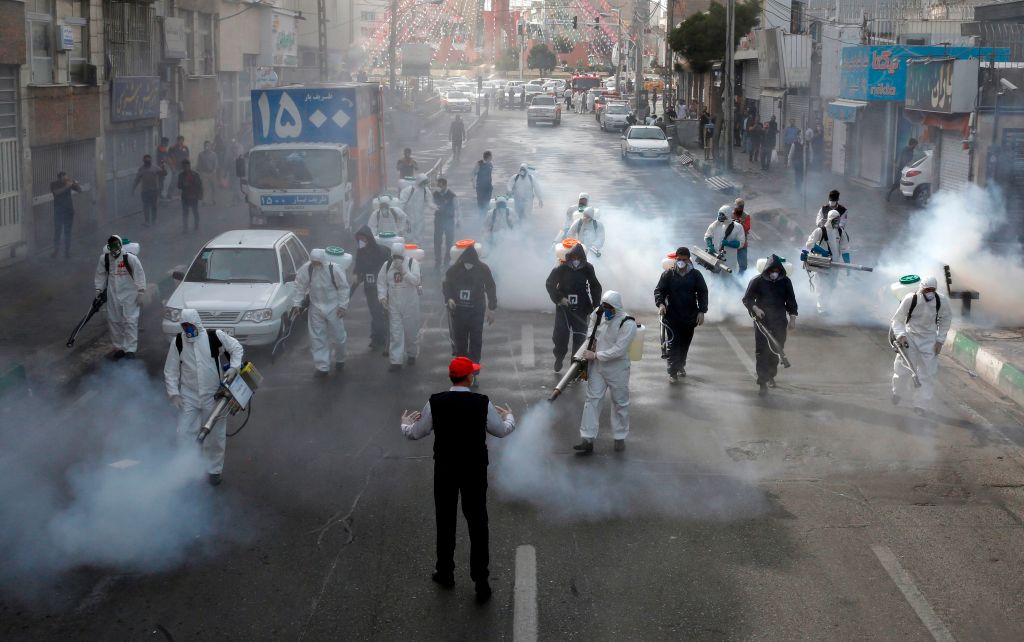
Update from AIJAC
04/20 #01
This Update focusses on the debate over the calls by some to ease sanctions on Iran because of the coronavirus crisis – with even presumptive US Democratic candidate for President Joe Biden issuing such a call recently.
It also contains some analysis of the intense coalition negotiations that have been going on in Israel between Binyamin Netanyahu of Likud and Benny Gantz of Blue and White to form a unity government – with the latest reports from Israel suggesting they are now close to announcing a deal. (Some up to date discussion of the latest developments in Israeli politics comes from AIJAC’s Ahron Shapiro).
We lead with the head of the Foundation for Defence of Democracies and veteran columnist Cliff May arguing that simply lifting the sanctions will help fund Iranian terrorism and neo-imperialism, not help with the medical crisis. He says that many of the current calls to lift sanctions come from the “echo chamber” on Iran policy established by the Obama Administration to support the JCPOA nuclear deal, and that sanctions are not limiting the import of medical or other humanitarian supplies. He also notes that the Iranian Ministry of Health not only says it has adequate access to medicine, they recently revoked permission for the independent NGO Doctors Without Borders to build an Intensive Care field hospital because it said Iran did not want or need a hospital established by foreigners. For his complete argument, CLICK HERE.
A look in more detail at how better to assist with the humanitarian needs of the Iranian people without lifting sanctions comes from Washington Institute for Near East Policy experts Katherine Bauer and Dana Stroul. They agree with May that Iran has funds to purchase humanitarian supplies and established channels to do so, but suggest minor technical changes and some public signaling to banks that can free up any remaining bottlenecks. They also recommend that, given the rejection of direct US aid by the Iranian regime, the US should be both seeking to help and sending a message of support for the Iranian people by funding and facilitating relief efforts by NGOs, as both the Bush and Obama Administrations did in the past. For this important and very knowledgable description of ways to help the Iranian people without lifting sanctions, CLICK HERE.
Finally, Haviv Rettig Gur of the Times of Israel looks at the fundamental dynamics of the Gantz-Netanyahu coalition talks in Israel which have been going on since Gantz announced his intention to join a unity government and split his party last Thursday. Gur looks at the debate in Israel over whether Gantz or Netanyahu have the advantage over the other, and the arguments for each. In the end, he concludes, each narrative tells a vital part of the political story and gives us key insights into what is really happening in the intense coalition bargaining still continuing For this must-read guide to what is really going on in Israeli politics this week, CLICK HERE.
Readers may also be interested in…
- Some more expert commentary on the effects of coronavirus on Iran is assembled by the Jewish News Syndicate here.
- A discussion of whether easing sanctions would accelerate Iran’s route to a nuclear bomb, from Yonah Jeremy Bob of the Jerusalem Post.
- Israeli coalition negotiations are taking place even as acting PM Netanyahu is again in quarantine, for a second time, after Health Minister Yaakov Litzman tested positive to COVID-19. Other senior government and defence officials have also had to self-isolate. Here’s how that works.
- Meanwhile, there are accusations that Litzman, controversial in Australia because of allegations he interfered in the extradition case against alleged child sex offender Malka Leifer, may have broken his own ministry’s social distancing rules.
- Some examples from the many stories and comments now appearing at AIJAC’s daily “Fresh AIR” blog:
- Naomi Levin and Ahron Shapiro look at how Israeli high tech is being marshalled in the battle with the novel coronavirus.
- Oved Lobel on how Palestinian official incitement continues to escalate despite good Israeli-Palestinian cooperation on coronavirus.
- Jamie Hyams on what a former Australian Ambassador to Israel had to say about ABC coverage of the Jewish state.
- A summary of what AIJAC Fellow and senior Israeli journalist and leading commentator Ehud Yaari had to say about recent developments in Israeli politics as the country moves closer to forming a national unity government, in an AIJAC webinar.
- Plus, in another AIJAC webinar, Dr Jonathan Schanzer of the Foundation for the Defense of Democracies explained that 2020 is likely to be the year of Iran’s precision-guided missile, as well as of COVID-19. In addition, a short video excerpt of his presentation is here.
Don’t listen to the echo chamber
Giving money to Iran’s rulers won’t help the Iranians they oppress
By Clifford D. May
Washington Times, April 1
 Obama Administration “spin-meister” Ben Rhodes boasted of creating an “echo chamber” on the Administration’s Iran policy. These are the same people now call for a lifting of sanctions on Iran to deal with COVID-19.
Obama Administration “spin-meister” Ben Rhodes boasted of creating an “echo chamber” on the Administration’s Iran policy. These are the same people now call for a lifting of sanctions on Iran to deal with COVID-19.
The “echo chamber” is back! You know what I’m talking about, right? Ben Rhodes was President Obama’s “deputy national security adviser for strategic communications,” a hifalutin term for the White House’s foreign policy spin-meister. Four springs ago, in The New York Times Magazine, ace journalist David Samuels profiled Mr. Rhodes, marveling at how he “skillfully shapes and ventriloquizes” the voices of “columnists and reporters.”
“We created an echo chamber,” Mr. Rhodes boasted in answer to a question about all those “cheerleading” for the Joint Comprehensive Plan of Action or JCPOA, the deal Mr. Obama cut with Iran’s rulers. Mr. Rhodes proudly noted that his friends in the media “were saying things that validated what we had given them to say.”
Despite those efforts, more than 60 percent of Congress did not, in the end, support the JCPOA, while polls showed the public disapproving by a 2 to 1 margin. Nevertheless, President Obama sealed the deal on his own authority in 2015. That made it relatively easy for his successor, on his own authority, to withdraw in 2018.
The chamber’s echoes never entirely faded away. Diehard deal supporters and defenders of the Tehran regime continued to lament America’s withdrawal from an agreement that enriched Iran’s rulers, funded terrorism abroad and repression at home while, at best, delaying their entry into the nuclear weapons club.
Which brings us to the present: The echo chamber’s new talking point, reverberating like a yodel in the Swiss Alps: The COVID-19 pandemic makes it imperative that the U.S. lift sanctions and provide billions of dollars to Iran’s theocrats!
“Demonstrating compassion in times of crisis is good foreign policy,” editorialized The New York Times, urging that the International Monetary Fund grant $5 billion in emergency funding to the regime “immediately.”
The Washington Post opined that President Trump and Supreme Leader Ali Khamenei should end “their war against each other.” Who knew that for 41 years “Death to America!” has really only meant “Death to Donald!”?
Mehdi Hasan, a columnist for the far-left Intercept charged: “The U.S. government is run by sociopaths. How else to explain the Trump administration’s callous disregard for the lives of ordinary Iranians in the midst of this global coronavirus crisis?”
An online publication of the Quincy Institute, a project of globalist George Soros and libertarian Charles Koch, asserted that U.S. sanctions are “cruelly and coldly calculated to cause as much human pain for the Iranian people as possible.”
 US Secretary of State Mike Pompeo: ” humanitarian assistance to Iran is wide open, it’s not sanctioned.”
US Secretary of State Mike Pompeo: ” humanitarian assistance to Iran is wide open, it’s not sanctioned.”
Consider some pertinent facts. Secretary of State Mike Pompeo declared last month: “The whole world should know that humanitarian assistance to Iran is wide open, it’s not sanctioned.”
He added: “There is no sanction on medicines going to Iran, there is no sanction on humanitarian assistance going into that country. They’ve got a terrible problem there and we want that humanitarian, medical assistance to get to the people of Iran.”
Meanwhile, not only has Mr. Khamenei refused offers of assistance from the U.S., he’s joined the propaganda campaign orchestrated by China’s Communist Party to blame America for the virus. “You might send people as doctors and therapists, maybe they would want to come here and see the effect of the poison they have produced in person,” he said in a speech broadcast across Iran.
Iran’s Ministry of Health, which says it has no problem getting medicines, last week revoked the approval previously given to Doctors Without Borders – an independent non-governmental organization – to build an intensive-care field hospital. Iranian officials said they have sufficient capacity. One such official tweeted that Iran does “not need hospitals established by foreigners.”
A serious question for the echo chamber: Why aren’t you telling Iran’s rulers to demonstrate compassion and make concessions?
To start, ask them to open their doors to credible NGOs without further delay or restrictions. Second, they should agree that all assistance will go through NGOs – not to Ayatollah Khamenei who will use it to strengthen state control, fund Bashar al-Assad’s slaughter in Syria and Hezbollah’s death grip on Lebanon, rather than to assist poor and powerless Iranians.
Third, don’t you think Iran’s rulers should release American and other foreign hostages and, while they’re at it, prisoners of conscience and religion?
Fourth, is it too much to expect the regime to halt attacks by its militias against Americans? Killing Americans while Americans are trying to save Iranians – you have no problem with that?
A few other activities from which Iran’s rulers might cease and desist: sending sophisticated weaponry to Hezbollah; inciting genocide against Israelis; further developing nuclear weapons and missiles; and blocking international inspectors — as they have been, despite promises made under the JCPOA.
Finally, Ayatollah Khamenei, 80 years young, is believed to have as much as $300 billion in assets under his control, resources he stole from Iranians insufficiently committed to the Islamic Revolution. If he were to donate $299 billion to fighting COVID-19, wouldn’t he still be able to spend his twilight years in comfort?
It boils down to this: If Iran’s rulers want support from the “international community,” they ought to become members in good standing of that community – or at least stop their most destructive activities.
The echo chamber is demanding instead that we pay the theocrats’ medical bills and provide them economic stimulus so they can fully fund their terrorism and neo-imperialism.
Here’s a more strategic and moral approach: We do whatever we can to help the long-suffering people of Iran. But not a finger do we lift for those who, amidst this crisis, continue to oppress, impoverish and persecute the people of Iran, while aggressing against both their neighbors and us.
Clifford D. May is founder and president of the Foundation for Defense of Democracies (FDD) and a columnist for the Washington Times.
Sanctions relief isn’t necessary to assist Iran’s coronavirus response
BY KATHERINE BAUER AND DANA STROUL
The Hill, 31/3/20
The rapid spread of the coronavirus in Iran is deeply alarming, as are the severe difficulties facing the Iranian government — which continues to mishandle its response — in dealing with the outbreak, treating the ill, and taking necessary preventive measures. Iran ranks sixth worldwide for confirmed cases of COVID-19, and fourth for deaths from the virus. The reality is likely far worse, considering the lack of testing capacity and the government’s inclination to lie. Given what public health experts anticipate about the lethal trajectory of this virus, the instinct to assist other countries — such as Iran — in their efforts to flatten the curve is perfectly understandable.
In the case of Iran and its struggle to contain the virus and treat the sick, however, sanctions relief is not a cure-all. Moreover, systematic corruption of Iran’s leaders and the weak capacity of its government mean it is doubtful that lifting sanctions would translate into the robust response the Iranian people need and deserve.
However, there are actions that the United States could take — short of lifting sanctions — to aid the humanitarian response in Iran. Without fundamentally altering the sanctions infrastructure, the administration could provide greater clarity on allowable humanitarian trade and authorizations for nongovernmental organizations (NGOs) to expand their work in Iran.
Iran does have access to funds to pay for medical and humanitarian supplies. It does not need emergency loans or sanctions waivers to finance humanitarian purchases from abroad. Even though the Trump administration sanctioned the Central Bank of Iran (CBI) in September 2019 for supporting terrorism, the Treasury Department recently took action to allow humanitarian trade transactions involving the CBI. The Treasury could clearly inform banks that Iran is authorized to use the foreign exchange held in CBI accounts abroad, including Iranian oil revenues stuck in escrow accounts in China, Japan, India and South Korea, to finance the importation of goods that will help the government respond to its coronavirus outbreak.
And despite U.S. sanctions, mechanisms exist for Iran to import medical and humanitarian goods, and additional ones could come online soon. On March 23, South Korea’s Foreign Ministry announced that it was considering ways to provide humanitarian relief to Iran. This could include establishing a mechanism such as the Swiss channel, inaugurated last month by agreement between the U.S. and Switzerland to facilitate humanitarian-related trade with Iran by Swiss firms. The Swiss channel was designed, in part, as a work-around for the sanctioned CBI. So the kicker is that South Korea does not even need to establish its version of the Swiss channel to assist Iran.
But Iran is still struggling to obtain supplies despite technical changes that should make it easier for Iran to access its offshore accounts, and despite the existence of mechanisms designed specifically to ensure that humanitarian supplies can reach the Iranian people.
The most significant obstacle is foreign banks, who are wary of U.S. sanctions and inclined to avoid the risk of facilitating these transactions out of an abundance of caution. Iran’s return to the Financial Action Task Force’s blacklist in February is an additional obstacle. U.S. sanctions have broad humanitarian exemptions built in, and personal protective equipment and ventilators are specifically allowable. Even though the Treasury Department allows for the sale to Iran of relevant medical devices and will provide reassurances to banks facilitating these transactions, the fear of U.S. sanctions is a deterrent. There is widespread confusion and concern about not running afoul of U.S. sanctions on Iran.
The Trump administration could, therefore, do much more on the public diplomacy front to signal that it has no intention of blocking firms and companies for working with Iran to address its coronavirus outbreak. Treasury could issue additional guidance clarifying which humanitarian goods are allowable. In these days of telework, a virtual town hall with senior officials is a no-brainer in order to clarify that the administration will not block the provision, or financing, of medical devices to Iran necessary for treating coronavirus patients. Social media outreach, and even a short statement from the White House podium during the daily Coronavirus Task Force briefings, are easy steps to take.
The White House also could demonstrate goodwill toward the Iranian people, as distinct from its policy of regime behavior change, by publicly supporting the delivery of humanitarian supplies and work of NGOs. And there is precedent for this. In 2003, the Bush administration issued a 90-day General License that facilitated NGO work in Iran to assist in recovery efforts after the Bam earthquake killed more than 26,000 people. In 2012, the Obama administration issued a 45-day General License to allow NGOs up to $300,000 to Iran for humanitarian and reconstruction activities after earthquakes killed more than 260 people.
Iran already has rejected U.S. offers of aid, but the administration should continue to find ways to signal to Iran’s leaders that the offer is genuine and a standing one, if not through direct aid then by signaling its willingness to facilitate the work of NGOs. Many elements of these temporary authorizations for disaster response and NGO activities have been made permanent in recent years. However, it would not be unprecedented for Treasury to issue a new license consolidating existing authorizations to clarify that they apply to current circumstances, or to expand some authorizations, even if time-limited. Members of Congress can assist here, as can the international organizations and NGOs already assisting Iran.
The U.S.-led sanctions architecture has changed significantly since the Bush and Obama administrations implemented their policies of humanitarian goodwill crisis-response, not only because of the Trump administration’s maximum-pressure campaign but also through legislative action. In 2017, Congress passed the Countering American Adversaries Through Sanctions law (CAATSA) which directed the administration to sanction Iran’s Islamic Revolutionary Guard Corps (IRGC) under counterterrorism authorities. This represented a serious expansion of terrorism-related Iran sanctions. Reports that the IRGC is involved alongside Iran’s Ministry of Health in setting up mobile clinics and producing medical equipment is an added layer of complexity for the U.S. and those around the world wanting to help Iran.
The international community is rightly focused on taking all necessary steps to respond to COVID-19, while also taking steps to prepare to respond to the next wave. In the case of Iran, there are a range of actions that the United States can and should take — it is both a security issue and a moral imperative to do so. But sanctions relief should not be at the top of the list of these remedial actions.
Katherine Bauer is the Blumenstein-Katz Family fellow at The Washington Institute for Near East Policy and a former Treasury official who served as the department’s financial attaché in Jerusalem and the Gulf. She is also an adjunct associate professor in the Security Studies Program at Georgetown University’s Edmund A Walsh School of Foreign Service. Follow her on Twitter @katecbauer.
Dana Stroul is a senior fellow in The Washington Institute’s Geduld Program on Arab Politics, served as a senior staff member on the Senate Foreign Relations Committee, covering the Middle East, North Africa and Turkey, and previously served in the Middle East policy office of the secretary of Defense. Follow her on Twitter @dstroul.
Win-win coalition? Both Netanyahu and Gantz can make case for victory in talks
PM relinquishes his right-wing agenda for political stability and personal immunity, while Gantz secures a veto on conservative policies while backing off long-term policy goals
By HAVIV RETTIG GUR
Times of Israel, 30 March 2020
 President Reuven Rivlin, center, Prime Minister Benjamin Netanyahu, left, and Blue and White leader Benny Gantz shake hands at the memorial ceremony for the late president Shimon Peres at the Mount Herzl cemetery in Jerusalem on September 19, 2019. (Yonatan Sindel/Flash90)
President Reuven Rivlin, center, Prime Minister Benjamin Netanyahu, left, and Blue and White leader Benny Gantz shake hands at the memorial ceremony for the late president Shimon Peres at the Mount Herzl cemetery in Jerusalem on September 19, 2019. (Yonatan Sindel/Flash90)
Nothing testifies to the seriousness of the coalition talks between Benjamin Netanyahu’s Likud and Benny Gantz’s shrunken Blue and White faction more than the deep and growing frustration from the right at the emerging coalition government.
Those right-wing elements — Yamina, the rightist flanks of Likud and to some extent the Haredi parties — are the clear losers from the coalition. Each has lost ministerial posts and will have shrunken policy influence.
But what isn’t yet clear is which of the two leaders, Benny Gantz or Benjamin Netanyahu, has the advantage over the other.
There are two competing narratives percolating through the Israeli political system, both richly detailed and convincing, as to who is winning the complicated tug of war between Likud and Blue and White.
Why Gantz is winning
On Thursday, in the immediate aftermath of Benny Gantz’s abandonment of his partners in the Blue and White alliance, the general consensus seemed to be that a naive Gantz had fallen for the latest of Netanyahu’s infamous tricks.
By Sunday, that talk of Netanyahu “outsmarting” Gantz was largely gone. Gone, too, were the clever certainties of the pundits that Netanyahu will soon betray Gantz: that after convincing the former IDF chief of staff to irrevocably sunder his alliance with Yesh Atid and split the once-powerful 33-seat Blue and White into two medium-sized parties (plus a two-seat Derech Eretz faction) that can never again threaten him at the ballot box, Netanyahu would then abandon Gantz for a different shattered remnant of the 61-seat bloc that had opposed him as recently as Thursday morning. Gantz would be left with nothing, and Netanyahu would once again stand unopposed at the apex of Israeli politics.
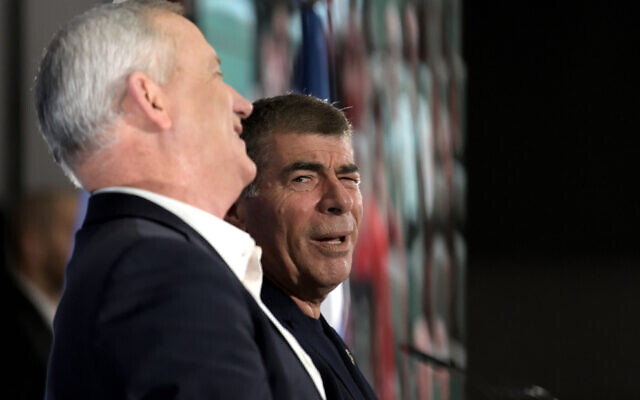 Benny Gantz (L) and Gabi Ashkenazi at a Blue and White campaign event in Kfar Saba on February 12, 2020. (Gili Yaari/Flash90)
Benny Gantz (L) and Gabi Ashkenazi at a Blue and White campaign event in Kfar Saba on February 12, 2020. (Gili Yaari/Flash90)
The main problem with these theories arose in the coalition talks. As Sunday wore on and the extent of Netanyahu’s generosity toward his once-bitter foe became clear, a different kind of discourse became pervasive on the right.
“How embarrassing, how depressing. Nissenkorn to justice, Yamina humiliated and left out, the Kaminitz Law canceled, Labor is in. This isn’t what we dreamed of,” wrote Erel Segal, an influential right-wing pundit.
His complaints refer to a laundry list of right-wing demands that were seen headed to the cutting-room floor in the negotiations, despite the huge majority the 58-seat political right will have in the coming Netanyahu-led government. Blue and White’s Avi Nissenkorn, a left-leaning former union leader and the party’s candidate for justice minister, is expected to reverse the right’s efforts to reform and weaken the judiciary and state prosecution.
The religious-right Yamina party threatened to abandon the coalition and sit in the opposition over Netanyahu’s paltry offer of one full-term minister and another half-term minister in rotation with another party.
Canceling the 2017 “Kaminitz law,” which dramatically — and critics say unfairly — increased enforcement against illegal construction in Arab towns and villages, where such construction is rampant (and where residents accuse state authorities of providing insufficient building permits, forcing them to build illegally), was a key demand of the Arab-majority Joint List when it recommended Gantz for prime minister earlier this month.
Another prominent right-wing voice, the historian and commentator Gadi Taub, griped on Sunday: “We didn’t fight to get a center-left government with some right-wing trappings. For that we could have just gone with Blue and White.”
The complaints mounted. Would the oft-promised annexation of the Jordan Valley still take place if Gantz was in charge of the Defense Ministry, the agency that would be charged with carrying it out? What of the “historic opportunity” of the Trump peace plan that so defined Netanyahu’s campaign?
Gantz, who would call himself a centrist, in fact has offered support for the Trump plan and for annexing the Jordan Valley in certain circumstances, but the Likud-led bloc campaigned on portraying him and his allies as leftists, a pretense they have seemingly kept up even as the Blue and White leader looks to be transformed from rival to partner.
“Handing the defense and justice ministries to the left amounts to ideological submission to the left, and the destruction of our revolution in the Justice Ministry and our legalization efforts in Judea and Samaria in recent years,” tweeted an angry MK Ayelet Shaked of Yamina, a former justice minister.
“In the next government, the minority is going to control and manage the country,” fumed Transportation Minister Betzalel Smotrich, also of Yamina.
 Former justice minister and Yamina lawmaker Ayelet Shaked at the Maariv conference in Herzliya, on February 26, 2020. (Miriam Alster/Flash90)
Former justice minister and Yamina lawmaker Ayelet Shaked at the Maariv conference in Herzliya, on February 26, 2020. (Miriam Alster/Flash90)
The list of concessions handed to Gantz so far in the negotiations is long indeed. Gantz demanded and will receive an almost one-to-one ratio of MKs to ministries in the new coalition. Netanyahu’s loyal religious-right allies will be lucky to be left with a minister for every four lawmakers.
To satisfy both his angry allies and his newfound partner, Netanyahu is now contemplating inventing new and uniquely unimportant ministries: a tiny, symbolic “ministry for minority development” (a splinter from the already minuscule ministry of social equality); a split of the welfare and labor ministry into a distinct labor ministry and a welfare ministry; dividing the culture and sports ministry; even the Jerusalem and heritage ministry is facing a split into a Jerusalem ministry and an entire cabinet-level post to oversee a handful of museums and heritage sites.
The government is now expected to grow to as many as 36 ministers, which would be the largest-ever government in Israel’s history. Netanyahu is also planning to appoint Likud cabinet hopefuls to senior ambassadorships set to open up — in Washington, London and at the UN for a start — just to shorten the list of angry MKs from his own camp he will have to deal with in the coming Knesset.
Though talks are still ongoing, Likud has already conceded (as of Monday afternoon at least) that its former Knesset speaker Yuli Edelstein would not return to the speaker’s chair — a punishment demanded by Gantz for Edelstein’s refusal to obey a court order last week over the scheduling of a vote on his replacement. Gantz even enjoys a veto over the next public security minister, even though the ministry will be held by Likud.
It is a government built entirely around the needs of coalition politics — the need, that is, to satisfy Gantz’s demands.
 The Knesset Arrangements committee meets amid the coronavirus crisis to approve the breakaway of the Yesh Atid and Telem factions from the centrist Blue and White party, March 29, 2020. (Knesset)
The Knesset Arrangements committee meets amid the coronavirus crisis to approve the breakaway of the Yesh Atid and Telem factions from the centrist Blue and White party, March 29, 2020. (Knesset)
For Gantz, his enormous cabinet presence of some 15 ministers (the exact number hasn’t been finalized) isn’t just a sign of his negotiating leverage; it’s a sign of his priorities. His faction is so invested in managing executive-branch agencies that almost no one will be left in the parliament building to push significant legislation or be a meaningful presence in budget fights. In other words, Gantz isn’t planning to advance the kind of long-term policy shifts that demand legislation.
That’s what drove MK Gadeer Kamal Mreeh, the first Druze woman MK in Israel’s history and a close ally of Gantz, to storm out of his party on Saturday with the accusation that Gantz was “abandoning principles.” The specific principle he had abandoned: dropping his promise to push an amendment to the nation-state law to include a mention of equality for minorities, a top priority for Mreeh’s Druze community.
Similar complaints were heard on Sunday from gay rights advocates, who had backed Gantz for his promise of civil marriage and greater recognition for gay families. That, too, was now on the back burner.
Gantz is abandoning the legislative arena for another priority that runs like a consistent theme through the negotiations: seizing control of every agency of government that the political right was planning to use to advance distinctly right-wing policies, and reversing those policies. That includes defense, justice, culture and other portfolios.
 Blue and White’s Gadeer Kamal-Mreeh (right), party leader Benny Gantz and other activists at a meeting with members of the Druze community in Daliyat al-Karmel, northern Israel, March 7, 2019. (Meir Vaknin/Flash90)
Blue and White’s Gadeer Kamal-Mreeh (right), party leader Benny Gantz and other activists at a meeting with members of the Druze community in Daliyat al-Karmel, northern Israel, March 7, 2019. (Meir Vaknin/Flash90)
Everything is devoted to that effort. Even Labor party leader Amir Peretz, who is heading into the Netanyahu government alongside Gantz and with Gantz negotiating for him, is set to take control of the Economy Ministry and the government agency dealing with the special housing and education needs of the Bedouin. That agency, the Authority for the Development and Settlement of the Bedouin in the Negev, has been part of the Agriculture Ministry in recent years, a right-wing-led branch of government that used the authority as an instrument for reining in the unfettered and unzoned expansion of Bedouin encampments throughout the south. Under a Labor economy minister, the focus will shift to the authority’s responsibility to provide services and bolster empowerment programs in the Bedouin community.
And so it is with agency after agency, ministry after ministry: Gantz systematically disabling and dismantling the right’s policy agenda at every turn.
But why is Netanyahu playing along?
He’s obviously eager to avoid yet another election amid the coronavirus pandemic. To do that he needed one more party to expand his 58-seat rightist bloc into a majority — and better Gantz’s 15 seats than three or four paltry seats from the likes of Labor and Gesher, which might put him over the top but not by a large enough margin to free him from his dependence on other partners like Yamina.
But that doesn’t explain the astounding generosity. Is Gantz’s support so vital that it’s worth leaving a trail of bitter allies wondering how they could have been duped? So strong was the disaffection on Sunday that some pundits wondered if Netanyahu’s generosity to Gantz signaled that he doesn’t intend to run in any more elections.
Could Netanyahu be engineering his exit from political life? After all, when he finally signs the rotation deal with Gantz, Netanyahu will for the first time have committed in writing to leaving power.
And indeed, this promise to step down, mocked by many over the weekend, has become a serious commitment in the fine print of the developing coalition agreement.
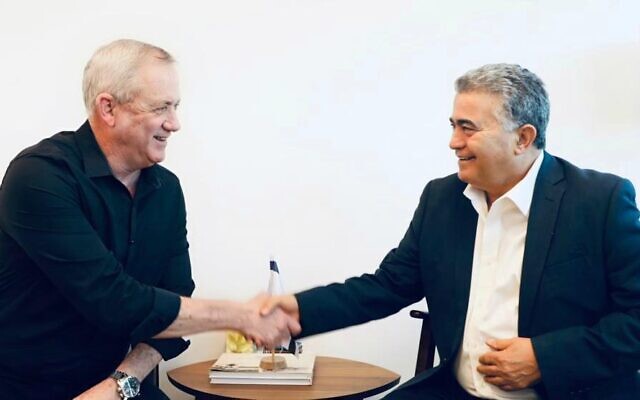 lue and White leader Benny Gantz, left, and Labor party leader Amir Peretz meet to discuss coalition talks, on March 11, 2020. (Blue and White/Elad Malka)
lue and White leader Benny Gantz, left, and Labor party leader Amir Peretz meet to discuss coalition talks, on March 11, 2020. (Blue and White/Elad Malka)
One example: Likud offered a mechanism to help bolster Gantz’s confidence in Netanyahu’s good intentions. First proposed in the September talks, the idea is to pass legislation that would ensure that if a rotation government dissolves before its scheduled expiration date, the candidate with the least time in the prime minister’s chair would be automatically appointed interim prime minister. That is, if Netanyahu clings to power until September 2021, but then attempts to engineer a coalition crisis and force new elections to avoid handing the PMO to Gantz, Gantz would in any case become prime minister from the moment the government dissolves until a new government is formed — a period that could reasonably stretch some five months (or in a strange case like the past year’s indecisive election results, far longer).
Another example: The agreement will stipulate that Gantz’s term be approved in the upcoming Knesset vote on the Netanyahu government — that is, that Gantz won’t need to worry about obtaining Likud MKs’ votes of confidence in the Knesset 18 months from now to reaffirm the deal.
No matter what, Netanyahu is promising, Gantz will be prime minister.
Or is Netanyahu winning?
Netanyahu’s uncharacteristic generosity to a political rival and his seeming earnestness raise the obvious question: What’s he getting in return?
Simple, say the proponents of this narrative: protection from his legal troubles, and not just for the moment but for years to come.
Part of the coalition agreement is expected to stipulate the formation of a new position established just for a post-PM Netanyahu, an “acting PM” role whose immunity protections under law would be identical to the serving prime minister’s. Unlike regular cabinet ministers, he would not be required to resign due to an indictment filed against him. He could remain in his post until and unless he is convicted following his final appeal.
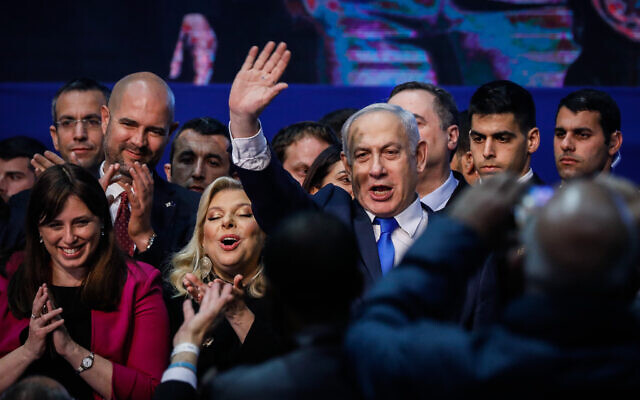 Prime Minister Benjamin Netanyahu and his wife Sara addresses their supporters on the night of the Israeli elections, at the party headquarters in Tel Aviv, on March 3, 2020. (Olivier Fitoussi/Flash90)
Prime Minister Benjamin Netanyahu and his wife Sara addresses their supporters on the night of the Israeli elections, at the party headquarters in Tel Aviv, on March 3, 2020. (Olivier Fitoussi/Flash90)
Netanyahu is also all but certain to seek parliamentary immunity once more. With so much now hanging in the balance for Gantz — a powerful role in the coalition and no political home to go back to — Netanyahu might reasonably expect majority support for his immunity bid.
It’s a bitter pill to swallow for the ideological right, and many are saying so openly: after a long and bitter year of soldiering, Netanyahu’s most loyal soldiers are now watching him sell their ideals and aspirations for his personal safety.
However, some observers say Netanyahu’s generosity isn’t a sign of desperation, but a function of his strategy last week for detaching Gantz from his former allies. When the two leaders first discussed a unity agreement on Wednesday, Gantz explained he was worried that breaking up his 33-seat party would leave him without the leverage to obtain the minimum in coalition talks that would make the move worthwhile.
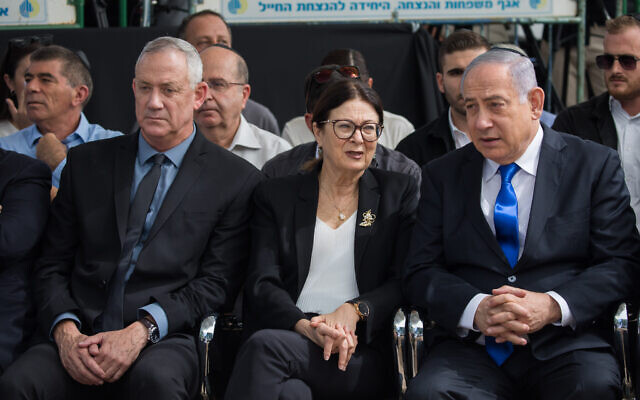 Prime Minister Benjamin Netanyahu (right), Blue and White leader Benny Gantz (left) and Chief Justice of Supreme Court Esther Hayut at the memorial ceremony for the late President Shimon Peres, at the Mount Herzl cemetery in Jerusalem, on September 19, 2019. (Yonatan Sindel/Flash90)
Prime Minister Benjamin Netanyahu (right), Blue and White leader Benny Gantz (left) and Chief Justice of Supreme Court Esther Hayut at the memorial ceremony for the late President Shimon Peres, at the Mount Herzl cemetery in Jerusalem, on September 19, 2019. (Yonatan Sindel/Flash90)
Netanyahu made a simple calculation: he needed Blue and White to obtain a stable coalition — but the smaller that Blue and White faction was, the better. So he promised Gantz to treat a shared government on an equal one-to-one unity basis, regardless of the number of MKs Gantz actually brought with him.
By thus giving Gantz the assurances he needed to break away from his longtime partner Yair Lapid, Netanyahu obtained his Knesset majority — and with the added boon of an “equal” partner that lacked the numbers in the Knesset to pose a serious threat to Likud or Netanyahu. That Lapid would be on the outside didn’t hurt either; the coalition wouldn’t have to endure the constant strain of Lapid and the Haredi parties battling from within on religion-and-state issues.
In other words, Netanyahu’s generosity wasn’t a sign of weakness, but of strength. He bought Gantz off, attracted enough of his hangers-on — Labor, Gesher, Derech Eretz — to ensure Gantz could not easily topple him down the road, and dismantled the strategic threat of the Blue and White alliance. And the price for all that: a roll-back on the right’s signature policies.
In the end, both narratives tell a vital part of the story. Netanyahu has his government and is safely returning to the PMO. The cost — a full egalitarian unity deal with Gantz — was unavoidable. Gantz, meanwhile, controls the key levers of policy and will hold the line against the right’s agenda in the coming months (and maybe even years), all while giving the country the stability it needs to deal with the coronavirus pandemic.
The cost for him, too, was unavoidable, and included giving up most of his campaign promises. Netanyahu remains in power, no laws will pass prohibiting indicted MKs from serving as premier, no new initiatives will be launched for peace talks or separation from the Palestinians, no religion-and-state reforms will be advanced, the nation-state law will not be changed, and none of the right-wing legislation of the past decade will be overturned.
Perhaps both narratives are wrong, then. Perhaps neither won, and the best they can show for their efforts was that they managed to obstruct the other.





